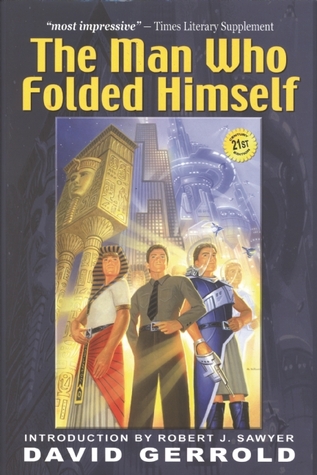Today I'm looking at a science-fiction and time-travel novel, The Man Who Folded Himself, which I have been told by the library website, GoodReads, and the introduction and afterword of this book that a lot of people think this is the best darn time-travel novel to come down the pike in a long time. Unfortunately, I find myself disagreeing rather strenuously with this assertion. The edition that I listened to is a little different than the original 1973 release, being re-released thirty years later and updated with some references, such as to the September 11th attacks, which makes this feel not like a ground-breaker in the field of science fiction but just another, if somewhat weirder, variation of the same tired themes.
The book follows the adventures of Daniel Jameson Eakins, a boy raised by his Uncle Jim and given the very generous allowance of a thousand dollars a week just to go to college and keep his nose clean. One day in 2005, Uncle Jim shows up mysteriously at Danny's apartment and tells Danny to start keeping a diary, just of the important things. The next day, Danny's informed his Uncle Jim is dead and Jim's lawyers inform Danny of a few things. First, his uncle has bequeathed him a package containing a belt, and second, instead of $143 million Danny has a mere six thousand dollars to his name. Rather confused by this turn of events, Danny grows even more confused when he discovers the belt given to him by his uncle is, in fact, a time belt that allows him to travel through the time-space continuum at will.
What follows is Danny having adventures through time and space and beginning to wonder what pronouns such as I really mean and how timestreams really work. As I was listening to this book, which came out in 1973, I couldn't help but compare it to two short stories by Heinlein. In particular By His Bootstraps, first published 1941, and All You Zombies, first published in 1959. By His Bootstraps is story about a man who ends up creating a stable predestination paradox where he ends up emperor of his own little world through time travel. He has pulled himself up by his bootstraps because his future self is helping his past self get to where his future self will be. And that's a significant chunk of The Man Who Folded Himself. Danny uses the benefits of time travel to make himself an insane amount of money, first with horse races and then with timely investments in the stock market. Eventually he does end up worth $143 million, but has access to considerably more money beyond that. So Danny using time travel to benefit himself immensely from a financial standpoint is hardly new and different.
Where The Man Who Folded Himself differs is that while By His Bootstraps is a stable, predestination paradox, The Man Who Folded Himself has lots of outright paradoxes. At multiple points Danny does things differently, like wear a different set of clothing or change a bet slightly, or even go back in time and warn himself out of doing something. Ordinarily you'd think this would create multiple paradoxes, especially the classic grandfather paradox, and Danny would have to untangle these. But instead, Danny doesn't have to deal with the consequences. If he doesn't like them, he can just change them. And if it creates a paradox, he doesn't have to worry about it at all, because every time he changes something in the past, it creates a new timestream that he enters and he's unable to return to the old timestream because the past has been altered. I felt like this was a convenient workaround for Gerrold more than anything else because we could ignore the issue of paradoxes and let Danny do whatever the heck he wanted.
Now, some of you might be familiar with All You Zombies, which is a time travel short story in which all the characters involved are the same person. One individual, through the use of time travel and hermaphroditism, is both their mother and their father and is responsible for conceiving themselves. Oh, and is also the bartender. But that's not important. Point is, somebody decided using time travel to have sex with themselves was a fantastic idea. Gerrold uses the same idea in his book, and I actually saw it coming because it was very heavily foreshadowed. Danny has sex with himself many times, in fact even engages in orgies consisting of just himself. Plus, through the use of time travel and a female version of himself named Diane, manages to conceive himself and ensure his continued existence within the time stream, which was also pretty heavily foreshadowed.
Honestly, I just don't get the appeal of something like this. Apparently there's some people who find this really interesting or even attractive on some level. But I simply do not understand the appeal of using time travel just to have sex with yourself. I understand that it was really forward of Gerrold to have gay romance and sexual activity in a book in 1973, but the fact that it's Danny doing it with himself just feels really darn weird. Plus the way that Danny describes it makes him sound like an insane narcissist who can only love himself and only has sex with himself because he's incapable of loving or being attracted to another person. It just seems very weird to me.
Overall I don't feel like this book really did anything that hadn't been done in a couple of Heinlein short stories before. It's just weird and for a time travel story really predictable. Obviously there are some people who really like this book but I find myself just not understanding the appeal.
- Kalpar


No comments:
Post a Comment